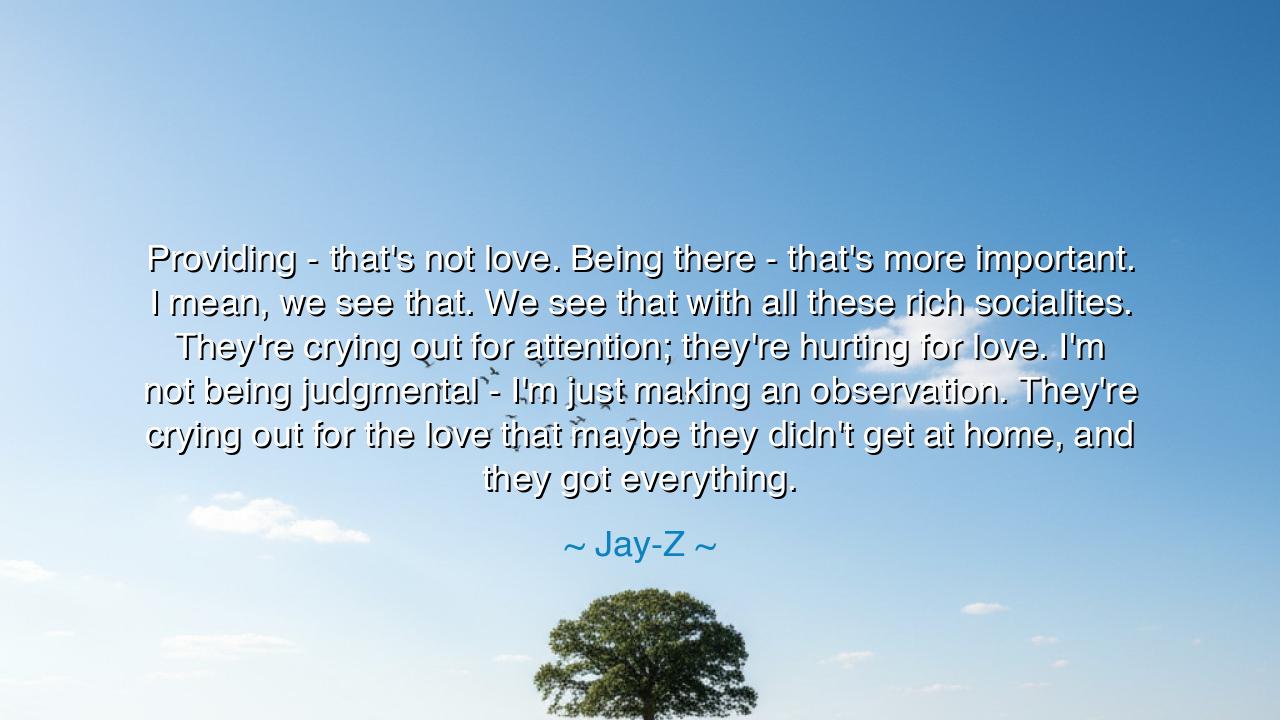
Providing - that's not love. Being there - that's more important.
Providing - that's not love. Being there - that's more important. I mean, we see that. We see that with all these rich socialites. They're crying out for attention; they're hurting for love. I'm not being judgmental - I'm just making an observation. They're crying out for the love that maybe they didn't get at home, and they got everything.






In the reflective and compassionate words of Jay-Z, the poet of the streets turned philosopher of success, we hear a truth that pierces through the illusions of wealth and material comfort: “Providing — that’s not love. Being there — that’s more important. I mean, we see that. We see that with all these rich socialites. They’re crying out for attention; they’re hurting for love. I’m not being judgmental — I’m just making an observation. They’re crying out for the love that maybe they didn’t get at home, and they got everything.” Beneath his calm tone lies a lesson as ancient as time itself — that love cannot be bought, measured, or replaced with gifts. The true wealth of the soul lies not in provision, but in presence.
Jay-Z speaks here not as a man of fame, but as one who has seen both sides of life — the hunger of poverty and the loneliness of abundance. He has lived among those who struggle to give their children food, and he has dined with those who can give their children the world — yet in both, he has seen the same wound. For love is not the act of providing things, but of giving oneself. To be there is the purest form of devotion — to offer one’s time, one’s listening, one’s steady presence. The ancients would call this the philia, the soul-bond that cannot be bought, that thrives only in closeness and care.
His words recall the wisdom of old: that riches may fill the house, but only love can fill the heart. Consider the tragic tale of King Midas, the man who begged the gods for the power to turn all he touched into gold. When his wish was granted, he rejoiced — until he touched his daughter and found her turned to lifeless metal. Then he wept, for he learned too late that to provide without presence is to destroy the very thing one means to cherish. Jay-Z’s insight is the same lesson reborn for the modern age: that many who “have everything” still ache, because they lack the one thing that cannot be replaced — love that stays.
In his observation of “rich socialites crying out for attention,” Jay-Z is not mocking but mourning. He sees that even in the gilded towers of privilege, the soul can starve. The children of wealth may inherit diamonds and mansions, yet remain orphans in spirit if they were never truly seen or held. Their hunger for attention is not vanity but a cry for warmth. The tragedy of abundance without love is that it blinds those who give; they mistake gifts for connection, and comfort for care. But the heart knows the difference. A child, or a friend, or a lover does not remember the cost of a gift, only the comfort of a hand that stayed when the world was cold.
The origin of Jay-Z’s quote lies in his journey — from the harsh corners of Brooklyn to the heights of global fame. He was a man who grew up without luxury, yet learned the value of loyalty, community, and being there. As success came, he witnessed another truth — that wealth brings comfort, but not healing. Through his music and his words, he has often wrestled with the meaning of love, fatherhood, and authentic connection in a world obsessed with image and possession. His reflection is not a condemnation of the rich, but a warning to all: that love’s absence cannot be disguised by abundance.
The ancients taught that love is not a transaction, but a covenant of hearts. The Stoic Epictetus wrote that “we are not disturbed by what we lack, but by the illusion that what we have can replace what we lack.” Jay-Z’s wisdom stands on that same eternal ground. A father may feed his child, but if he does not look into their eyes and listen to their voice, the child will grow full of food but empty of faith. A partner may shower another in gifts, but without empathy and understanding, the relationship becomes a gilded cage. The wise, therefore, know that to love truly is to give what no coin can purchase — one’s time, one’s presence, one’s soul.
Let this be the lesson: to provide is duty; to be present is devotion. Wealth may build walls, but love builds bridges. It is not what you give that makes another feel valued — it is how you stay. The one who loves well does not ask, “What can I buy?” but, “How can I listen? How can I be here?” Even in small moments — a conversation, a hand held in silence, a simple act of care — the heart receives more than any fortune could provide.
Action to take: look upon those you love and ask yourself — have I given them my presence, or only my provision? Step away from distraction, from labor, from the endless pursuit of more. Sit with them. Listen. Speak from the heart. For as Jay-Z reminds us, love is not measured by what you give, but by what you share — and the richest man is not he who has everything, but he who knows how to be there.






AAdministratorAdministrator
Welcome, honored guests. Please leave a comment, we will respond soon